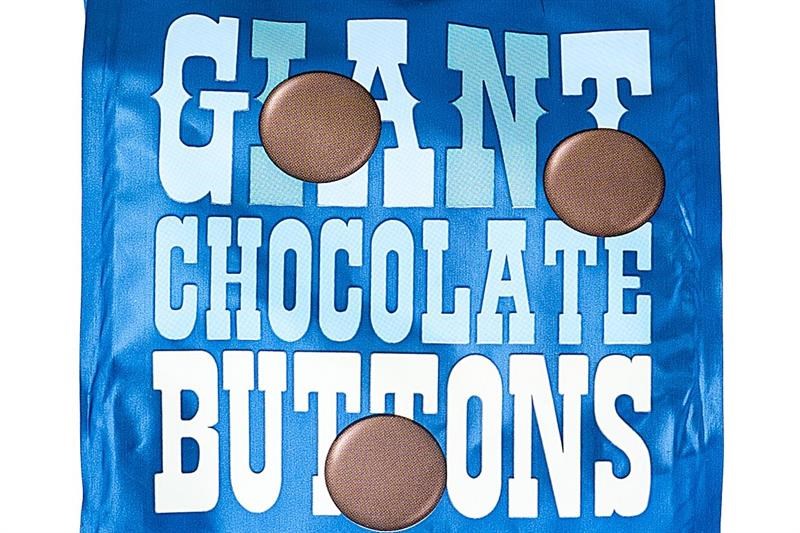Ban price deals on chocolate 'sharing' bags
Published: 26/01/2018
Campaigners are calling for a complete ban on all confectionery price promotions plus a sugar tax on all confectionery of at least 20%.
This follows a new product survey by experts at Action on Sugar who have exposed the high amounts of sugar in chocolate confectionery ‘sharing’ bags.
Of the 95 chocolate confectioneries surveyed, the ‘sharing’ bag with the highest amount of sugar per pack (i.e. Brookside Dark Chocolate Pomegranate Flavour 198g) contained an astonishing 29 teaspoons, which is four times an adult’s maximum daily sugar intake – almost 1,000 calories!
Next in line was Brookside Dark Chocolate Acai & Blueberry Flavors (198g) with 28 teaspoons of sugar per pack, followed by Marks & Spencer’s Gigantic Milk Chocolate Buttons (170g) and Lidl Mister Choc White Chocolate Giant Buttons (140g), both containing a whopping 23 teaspoons of sugar. The M&S pack suggests there are five portions in it, but even if the pack is shared between five, a single portion still contains nearly five teaspoons of sugar – almost a 7-10 year old’s maximum intake of sugar for an entire day.
At the time of data collection (Dec 17-Jan 18) from Tesco, Asda, Sainsbury’s, Morrisons, Co-op and Waitrose, each retailer was actively offering price promotions on some sharing bags (i.e. from as little as £1 per bag) which made them comparatively better value for money than smaller pack sizes.
In a new Twitter poll by Action on Sugar, almost nine out of ten (85%) consumers called for the removal of price promotions on confectionery sharing bags.
This coincides with a poll in The Grocer which revealed that over one in five adults (22.1%) don’t share BUT eat sharing bags alone, in one go. The figure was even higher for 16 to 24 year olds at 35.7%.
Consumption of confectionery is the second highest contributor to sugar intake in children, after soft drinks. If price promotions on high sugar products were removed, we could cut almost two teaspoons (7g) of sugar on average from every individual’s diet per day.
Despite the strong evidence and public support for such measures, the government has refused to tackle the level of price promotions on high sugar products to reduce excess sugar consumption.
Action on Sugar is now calling on Prime Minister Theresa May to immediately revise and strengthen her Childhood Obesity: a Plan for Action, and have suggested 10 steps to tackle marketing in their own soon-to-be published Action Plan to prevent obesity and type 2 diabetes.
Table 1: Examples of chocolate confectionery ‘sharing’ bags higher in sugar per pack
| Product | Sugar content per 100g (g) | Sugar per pack (g) | Sugar per pack (tsp) | Energy per pack (kcal) |
| Brookside Dark Chocolate Pomegranate Flavor 198g | 58.4 | 115.6 | 29 | 913 |
| Brookside Dark Chocolate Acai & Blueberry Flavors 198g | 57.5 | 113.9 | 28 | 921 |
| Marks & Spencer Gigantic Milk Chocolate Buttons 170g | 54.0 | 91.8 | 23 | 927 |
| Lidl Mister Choc White Chocolate Giant Buttons 140g | 64.7 | 90.6 | 23 | 776 |
| M&M's Chocolate 133g | 67.7 | 90.0 | 23 | 638 |
| Lidl Mister Choc Milk Chocolate Giant Buttons 140g | 61.9 | 86.7 | 22 | 722 |
| Buttermilk Crumbly Fudge Caramel Sea Salt 120g | 71.8 | 86.2 | 22 | 529 |
| Asda Giant White Chocolate Buttons 140g | 60 | 84.0 | 21 | 781 |
| Morrisons Giant Milk Chocolate Buttons 135g | 61.6 | 83.2 | 21 | 713 |
| GNAW Caramel Chocolate Buttons 150g | 53.7 | 80.6 | 20 | 837 |
Table 2: Examples of chocolate confectionery ‘sharing’ bags lower in sugar per pack
| Product | Sugar content per 100g (g) | Sugar per pack (g) | Sugar per pack (tsp) | Energy per pack (kcal) |
| Chocologic Giant Dark Chocolate Buttons 75g | 3.2 | 2.4 | 1 | 324 |
| Chocologic Giant Milk Chocolate Buttons 75g | 20.9 | 15.7 | 4 | 363 |
| Maltesers Treat bag 68g | 51.7 | 35.2 | 9 | 342 |
| Cadbury Picnic Bites 110g | 38 | 41.8 | 10 | 563 |
| Montezuma's 58% Cocoa Dark Chocolate Giant Buttons 100g | 42 | 42.0 | 11 | 547 |
Registered nutritionist Kawther Hashem, Researcher at Action on Sugar based at Queen Mary University of London said: 'Companies and supermarkets are constantly finding ways to push more sugary products – which are contributing to the high rates of obesity, type 2 diabetes and tooth decay in the UK. These types of price promotions (i.e. discounts) encourage us to eat far too much sugar and calories and should be banned. It is time retailers are pressed to act responsibly and no longer profit at the expense of our health.'
Graham MacGregor, Professor of Cardiovascular Medicine at Queen Mary University of London and Chairman of Action on Sugar added: 'It is shocking that food companies are being allowed to exploit consumers, by manipulating them into purchasing larger size bags of chocolate confectionery on the cheap. Prime Minister Theresa May is letting companies get away with this despite pledging to help the socially deprived when she first became the Prime Minster. Companies must be held accountable and reminded to reconsider their ethical and corporate responsibility.”
Jenny Rosborough, Campaign Manager and Registered Nutritionist at Action on Sugar added: 'The government published its half-hearted obesity plan in 2016 along with confirmation that this was "the start of the conversation" – we now need to see proof that the health of our children is the top priority. An improved childhood obesity plan must clamp down on promotional and marketing tactics that encourages nothing more than excess sugar and calorie consumption, and we hope they take our suggestions on board.'
Author: Julie Bissett













